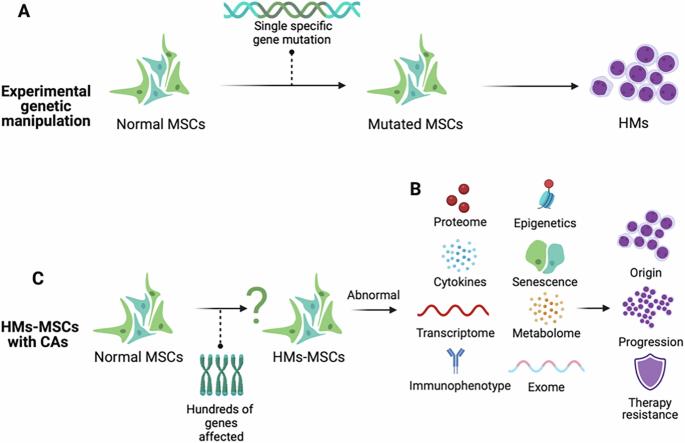Chromosomal abnormalities of mesenchymal stromal cells in hematological malignancies
IF 7.3
1区 医学
Q1 BIOCHEMISTRY & MOLECULAR BIOLOGY
引用次数: 0
Abstract
Historically, hematological malignancies (HMs) and solid cancers were primarily attributed to cell-intrinsic mechanisms. However, overwhelming evidence highlights the crucial role of the tumor microenvironment in this process. Abnormalities in the bone marrow microenvironment (BMM) contribute to the development of HMs and affect patient outcomes. Bone Marrow Mesenchymal Stromal Cells (BM-MSCs) represent one of the key cell types within the BMM. Interestingly, a single specific gene mutation in BM-MSCs is sufficient to disrupt normal hematopoiesis and promote clonal malignant hematopoiesis in mice. Since a particular mutation may be sufficient, attention must also be given to chromosomal abnormalities (CAs), potentially affecting hundreds of genes. Notably, CAs have been identified in the majority of HMs BM-MSCs. CAs have been detected more frequently in BM-MSCs of HMs patients than in healthy donors. The primary explanation for CAs is chromosomal instability (CIN), a phenomenon characterized by increased rates of CAs. CIN can lead to abnormal gene expression, cellular senescence, and inflammation, altering MSCs. It may compromise their anti-tumorigenic functions and shift the BMM towards a supportive or protective state. Despite the importance of CAs and CIN, cytogenetic results in HM-MSCs appear controversial. This review discusses current studies, suggesting that some of the controversies may result from technical limitations. Furthermore, based on the high incidence of CAs and the lack of patterns (randomness), we suggest this is a case of CIN. Therefore, instead of looking for CAs patterns, we must focus on understanding the phenomenon of CIN in these cells. This includes verifying the frequencies of non-clonal CAs, looking for specific CIN mechanisms and distinguishing whether CIN is a driver or a consequence of HMs. To guide future research and address the existing knowledge gaps, we discuss potential approaches to the challenges in studying CAs in HM-MSCs.

恶性血液病间充质间质细胞的染色体异常。
历史上,血液恶性肿瘤(HMs)和实体癌主要归因于细胞内在机制。然而,压倒性的证据强调了肿瘤微环境在这一过程中的关键作用。骨髓微环境(BMM)异常有助于HMs的发展并影响患者的预后。骨髓间充质基质细胞(bmscs)是骨髓间充质基质细胞中的关键细胞类型之一。有趣的是,BM-MSCs中单个特异性基因突变足以破坏小鼠正常造血并促进克隆恶性造血。由于一个特定的突变可能就足够了,因此还必须注意可能影响数百个基因的染色体异常(CAs)。值得注意的是,在大多数HMs - BM-MSCs中发现了ca。与健康供者相比,在ms患者的BM-MSCs中检测到ca的频率更高。对CAs的主要解释是染色体不稳定性(CIN),一种以CAs发生率增加为特征的现象。CIN可导致基因表达异常、细胞衰老和炎症,改变间充质干细胞。它可能损害它们的抗肿瘤功能,使BMM转向支持或保护状态。尽管CAs和CIN很重要,但在骨髓间充质干细胞中的细胞遗传学结果存在争议。这篇综述讨论了目前的研究,表明一些争议可能是由于技术限制造成的。此外,基于ca的高发病率和缺乏模式(随机性),我们认为这是一个CIN病例。因此,与其寻找CAs模式,我们必须重点了解这些细胞中的CIN现象。这包括验证非克隆ca的频率,寻找特定的CIN机制,并区分CIN是HMs的驱动因素还是结果。为了指导未来的研究和解决现有的知识空白,我们讨论了在HM-MSCs中研究ca的潜在方法。
本文章由计算机程序翻译,如有差异,请以英文原文为准。
求助全文
约1分钟内获得全文
求助全文
来源期刊

Oncogene
医学-生化与分子生物学
CiteScore
15.30
自引率
1.20%
发文量
404
审稿时长
1 months
期刊介绍:
Oncogene is dedicated to advancing our understanding of cancer processes through the publication of exceptional research. The journal seeks to disseminate work that challenges conventional theories and contributes to establishing new paradigms in the etio-pathogenesis, diagnosis, treatment, or prevention of cancers. Emphasis is placed on research shedding light on processes driving metastatic spread and providing crucial insights into cancer biology beyond existing knowledge.
Areas covered include the cellular and molecular biology of cancer, resistance to cancer therapies, and the development of improved approaches to enhance survival. Oncogene spans the spectrum of cancer biology, from fundamental and theoretical work to translational, applied, and clinical research, including early and late Phase clinical trials, particularly those with biologic and translational endpoints.
 求助内容:
求助内容: 应助结果提醒方式:
应助结果提醒方式:


